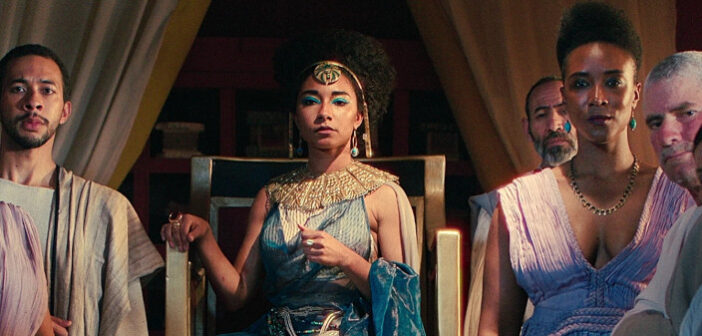Egypt has responded to the Netflix film African Queen by launching counter-programming initiatives to present its own account of the ruler’s life using “the highest levels of research and scrutiny.” Cleopatra’s narrative is being told throughout Egypt In the midst of continuous controversy. The Netflix film, which features Queen Elizabeth as a black woman, was launched on Wednesday.
Al Wathaeqya, Egypt’s state-sponsored documentary channel, has announced plans to create a documentary for United Media Services, a government-owned broadcaster. The announcement comes days after some people in the nation voiced their disapproval of the Netflix movie due to the Queen’s skin tone.
“Starting as usual in all documentary production sector and documentary channel work, there are working sessions currently being held with a number of specialists in history, archaeology, and anthropology; to subject research related to the subject of the film and its image to the highest levels of research and scrutiny,” the channel said, according to a translation of its Facebook post.
The state is not the only entity interested in telling a story about the Queen’s life; independent filmmakers are as well. Curtis Ryan Woodside, a director and Egyptologist, also published a 90-minute English-language video about Cleopatra VII on his YouTube channel on Wednesday, criticising the “biassed” views and “misinformed,” contemporary and American interpretations of the monarch that the Netflix film allegedly presents.
In his film, Woodside analyses Egypt’s multicultural society. Additionally, it includes comments from Zahi Hawass, a former Egyptian minister of state for antiquities affairs, and archaeologist Kathleen Martinez of the Dominican Republic, both of whom have fiercely criticised Netflix’s portrayal of the ancient king.
The Netflix film was produced by Jada Pinkett Smith. According to a recent discussion with Hawass, the only known Black Egyptian kings were the Kushite kings of the 25th dynasty (747–656 BC). Additionally, he refuted the thesis put out by Black Americans who are “obsessed” with Egypt’s colonial history and assert that Black people are the roots of Egyptian culture.
However, now the director of the show, Tina Gharavi, is finally speaking out. Hitting back at the criticism, Gharavi wrote in a new article written for Variety, about the backlash she has received over the casting.
Recalling seeing Elizabeth Taylor playing the role of an Egyptian ruler as a kid doesn’t feel right to her, she wrote, ”I remember as a kid seeing Elizabeth Taylor play Cleopatra. I was captivated, but even then, I felt the image was
not right. Was her skin really that white? With this new production, could I find the answers about Cleopatra’s heritage and release her from the stranglehold that Hollywood had placed on her image?”
Meanwhile, Tina Gharavi, the show’s director, is finally making a statement. Gharavi responded to the criticism in a recent essay she wrote for Variety, discussing the negative feedback she had gotten on the casting.
I recall seeing Elizabeth Taylor as Cleopatra when I was a youngster, but it doesn’t feel right to me,” she wrote. Even though I was entranced, I thought the picture was off. Did she truly have skin so white? Could I learn more about Cleopatra’s ancestry and free her from the constrictions Hollywood had imposed on her image with this new production?
”Doing the research, I realized what a political act it would be to see Cleopatra portrayed by a Black actress.” She wrote further.
”For me, the idea that people had gotten it so incredibly wrong before — historically, from Theda Bara to Monica Bellucci, and recently, with Angelina Jolie and Gal Gadot in the running to play her — meant we had to get it even more right. The hunt was on to find the right performer to bring Cleopatra into the 21st century.”
Gharavi questioned the people’s obsession to see Cleopatra white by noting: ”Why shouldn’t Cleopatra be a melanated sister? And why do some people need Cleopatra to be white? Her proximity to whiteness seems to give her value, and for some Egyptians, it seems to really matter.”
Not only Cleopatra’s beauty but through her casting, Gharavi said she also wanted to show her ”strength”.
Hitting back at the backlash, the director said, ”While shooting, I became the target of a huge online hate campaign. Egyptians accused me of “blackwashing” and “stealing” their history. Some threatened to ruin my career — which I wanted to tell them was laughable. I was ruining it very well for myself, thank you very much! No amount of reasoning or reminders that Arab invasions had not yet happened in Cleopatra’s age seemed to stem the tide of ridiculous comments.”
”Perhaps, it’s not just that I’ve directed a series that portrays Cleopatra as Black, but that I have asked Egyptians to see themselves as Africans, and they are furious at me for that. I am okay with this.”
She concluded her long letter noting how misogyny still has an effect on people. ”We need to liberate our imaginations, and boldly create a world in which we can explore our historical figures without fearing the complexity that comes with their depiction. I am proud to stand with “Queen Cleopatra” — a re-imagined Cleopatra — and with the team that made this.”
Before the director, the actress of the show Adele James reacted to all the backlash and said, “If you don’t like the casting, don’t watch the show.” The producer of the Netflix production also said that “her heritage is highly debated”.
Queen Cleopatra was born in the Egyptian port city of Alexandria in 69 BC. After her father’s death in 51 BC, she took over the throne and ruled until her death in 30 BC while the Roman Empire grew.
Experts in Egypt have stated she was Macedonian-Greek on the side of her father, Ptolemy XII. However, her maternal heritage is not clear and the ethnic origin of her mother is not clear. Historians have said it’s possible that she, or any other female ancestor, was an Indigenous Egyptian or from elsewhere in Africa.
According to experts in Egypt, She was Macedonian-Greek on the side of her father, Ptolemy XII,. However, it is unclear what ethnicity her mother is and what her maternal ancestry is. According to historians, she or any other female ancestor might have been an indigenous Egyptian or from another part of Africa.
Queen Cleopatra was released on Netflix May 10




